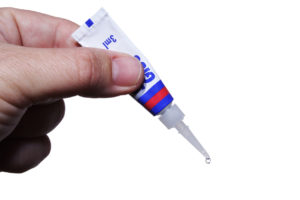Is Super Glue Waterproof?
The short answer is: super glue is waterproof.
Although the answer is difficult to find from a reputable source on the internet, our research confirms that most super glues on the market are waterproof. Just make sure that the adhesive base of your super glue is “Ethyl cyanoacrylate”. Ethyl cyanoacrylate is a common adhesive base used in many dishwasher-safe and weather-resistant superglues as its chemical structure is encouraged to bond when moisture is present.
Super Glue Is Water Proof.
There are many brands of this popular adhesive on the market. Most of them will boast that they’re 100% waterproof, and they’re not wrong.
Super glue is waterproof after you’ve allowed it to dry completely. We can attribute the adhesive and waterproof qualities of super glue to its active ingredient, Ethyl cyanoacrylate.
Cyanoacrylate is a rapid-action adhesive that polymerizes or thickens. By polymerizing, the adhesive creates strong bonds between two surfaces. For the best adhesion, you should allow the glue to dry and cure completely.
The bonding time shortens in slightly moist environments. Also, a moist environment makes the bonds created by ethyl cyanoacrylate stronger and longer lasting. Once completely dried and cured in super glue creates bonds that are impermeable to water, at least for a time.
Can Super Glue Stay Exposed to Water for Long Periods?
After you’ve bonded two surfaces or objects with super glue, you can expect the bond to hold up even underwater. However, there’s a catch — super glue won’t stay waterproof underwater forever. This is essential to consider, especially if you’re using super glue for items in an aquarium. This is because prolonged exposure to extreme moisture will eventually degrade the super glue.
If you used super glue to repair an item that gets minimal water exposure, it should keep the object in one piece. However, for something like an aquarium fixture or accessory, you’ll have to take the object out periodically and reapply super glue. For this reason, using a stronger epoxy would be a better solution than superglue.
Conclusion
Superglue is indeed waterproof, but not for extended periods of time. For fixing objects that come into occasional contact with water, superglue will hold its bond. But if the object is submerged for a lengthened period of time the bonds will weaken. Additionally, superglue is a valid solution for fixing objects in a moist environment, as the bonds that form from Ethyl cyanoacrylate do so under the presence of moisture. If you are looking to fix an item that must stay submerged, look to epoxy. Superglues much stronger older brother.



